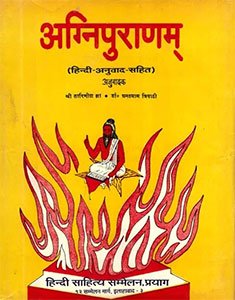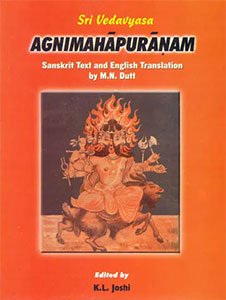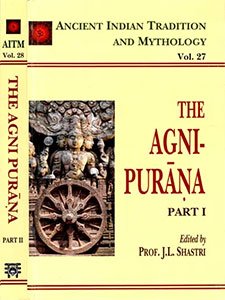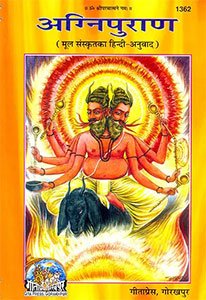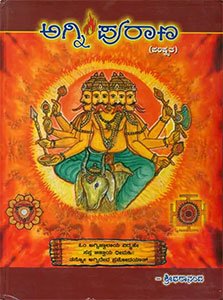Agni Purana [sanskrit]
97,288 words
This Sanskrit edition of the Agnipurana. It is one of the traditional eighteen Mahapuranas presented as an encyclopedia of ancient Indian history and knowledge. It contains either 382 or 383 chapters and over 10.000 verses (Sanskrit Shlokas).
Verse 215.34
अक्षरसूत्रधरा देवी पद्मासनगता शुभा ।
ओं तेजोऽसि महोऽसि बलमसि भ्राजोऽसि देवानान्धामनामासि ।
विश्वमसि विश्वायुः सर्वमसि सर्वायुः ओं अभि भूः ।
आगच्छ वरदे देवि जप्ये मे सन्निधौ भव ॥ ३४ ॥
akṣarasūtradharā devī padmāsanagatā śubhā |
oṃ tejo'si maho'si balamasi bhrājo'si devānāndhāmanāmāsi |
viśvamasi viśvāyuḥ sarvamasi sarvāyuḥ oṃ abhi bhūḥ |
āgaccha varade devi japye me sannidhau bhava || 34 ||
The Sanskrit text of Verse 215.34 is contained in the book The Agni Puranam (Anandashram Edition) by Shri Chimna Apate (श्री चिमणा आपटे). This book is available online or you could buy the latest edition:
Read online Buy now! The Sanskrit text by Shri Chimna Apate (श्री चिमणा आपटे) (1987)
Glossary of Sanskrit terms
Note: This extracts Sanskrit terms and links to English definitions from the glossary, based on an experimental segmentation of verse (215.34). Some terms could be superfluous while some might not be mentioned. Click on the word to show English definitions.
Akshara, Sutradhara, Devi, Devin, Padmasana, Gat, Gata, Shubha, Shubh, Teja, Tejas, Asi, Mahah, Mah, Maha, Mahan, Mahas, Bala, Bhraj, Bhraja, Bhrajas, Deva, Dhaman, Ama, Vishva, Vishvayu, Vishvayus, Sarvam, Sarva, Sarvayu, Sarvayus, Abhi, Bhu, Sha, Varada, Japya, Asmad, Sannidhi, Bhava,
Analysis of Sanskrit grammar
Note: this is an experimental feature and only shows the first possible analysis of the Sanskrit text (Verse 215.34). If the system was successful in segmenting the sentence, you will see of which words it is made up of, generally consisting of Nouns, Pronouns, Verbs, Participles and Indeclinables. Click on the link to show all possible derivations of the word.
- Line 1: “akṣarasūtradharā devī padmāsanagatā śubhā ”
- akṣara -
-
akṣara (noun, masculine)[compound], [vocative single]akṣara (noun, neuter)[compound], [vocative single]
- sūtradharā* -
-
sūtradhara (noun, masculine)[nominative plural], [vocative plural]sūtradharā (noun, feminine)[nominative plural], [vocative plural], [accusative plural]
- devī -
-
devī (noun, feminine)[compound], [nominative single]devin (noun, masculine)[nominative single]
- padmāsana -
-
padmāsana (noun, masculine)[compound], [vocative single]padmāsana (noun, neuter)[compound], [vocative single]
- gatā -
-
gat (noun, masculine)[instrumental single]gat (noun, neuter)[instrumental single]gatā (noun, feminine)[nominative single]
- śubhā -
-
śubhā (noun, feminine)[nominative single]śubh (noun, feminine)[instrumental single]
- Line 2: “oṃ tejo'si maho'si balamasi bhrājo'si devānāndhāmanāmāsi ”
- Cannot analyse om*te
- tejo' -
-
tejas (noun, neuter)[compound], [nominative single], [vocative single], [accusative single]teja (noun, masculine)[nominative single]
- asi -
-
asi (noun, feminine)[compound], [adverb]asi (noun, masculine)[compound], [adverb]asī (noun, feminine)[adverb], [vocative single]√as (verb class 2)[present active second single]
- maho' -
-
mahaḥ (indeclinable)[indeclinable]mahan (noun, neuter)[compound], [adverb], [nominative single], [vocative single], [accusative single]mahas (noun, neuter)[compound], [nominative single], [vocative single], [accusative single]mah (noun, masculine)[nominative plural], [vocative plural], [accusative plural], [ablative single], [genitive single]maha (noun, masculine)[nominative single]
- asi -
-
asi (noun, feminine)[compound], [adverb]asi (noun, masculine)[compound], [adverb]asī (noun, feminine)[adverb], [vocative single]√as (verb class 2)[present active second single]
- balam -
-
bala (noun, masculine)[adverb], [accusative single]bala (noun, neuter)[adverb], [nominative single], [accusative single]balā (noun, feminine)[adverb]
- asi -
-
asi (noun, feminine)[compound], [adverb]asi (noun, masculine)[compound], [adverb]asī (noun, feminine)[adverb], [vocative single]√as (verb class 2)[present active second single]
- bhrājo' -
-
bhrājas (noun, neuter)[compound], [nominative single], [vocative single], [accusative single]bhrāj (noun, feminine)[nominative plural], [vocative plural], [accusative plural], [ablative single], [genitive single]bhrāja (noun, masculine)[nominative single]
- asi -
-
asi (noun, feminine)[compound], [adverb]asi (noun, masculine)[compound], [adverb]asī (noun, feminine)[adverb], [vocative single]√as (verb class 2)[present active second single]
- devān -
-
deva (noun, masculine)[accusative plural]
- ān -
-
a (noun, masculine)[accusative plural]
- dhāman -
-
dhāman (noun, masculine)[vocative single]dhāman (noun, neuter)[vocative single]
- āmā -
-
āma (noun, masculine)[compound], [vocative single]āma (noun, neuter)[compound], [vocative single]āmā (noun, feminine)[nominative single]
- asi -
-
asi (noun, feminine)[compound], [adverb]asi (noun, masculine)[compound], [adverb]asī (noun, feminine)[adverb], [vocative single]√as (verb class 2)[present active second single]
- Line 3: “viśvamasi viśvāyuḥ sarvamasi sarvāyuḥ oṃ abhi bhūḥ ”
- viśvam -
-
viśva (noun, masculine)[adverb], [accusative single]viśva (noun, neuter)[nominative single], [accusative single]
- asi -
-
asi (noun, feminine)[compound], [adverb]asi (noun, masculine)[compound], [adverb]asī (noun, feminine)[adverb], [vocative single]√as (verb class 2)[present active second single]
- viśvāyuḥ -
-
viśvāyus (noun, masculine)[compound], [adverb], [nominative single], [vocative single]viśvāyus (noun, neuter)[compound], [adverb], [nominative single], [vocative single], [accusative single]viśvāyu (noun, masculine)[nominative single]viśvāyu (noun, feminine)[nominative single]
- sarvam -
-
sarvam (indeclinable)[indeclinable]sarva (noun, masculine)[adverb], [accusative single]sarva (noun, neuter)[nominative single], [accusative single]
- asi -
-
asi (noun, feminine)[compound], [adverb]asi (noun, masculine)[compound], [adverb]asī (noun, feminine)[adverb], [vocative single]√as (verb class 2)[present active second single]
- sarvāyuḥ -
-
sarvāyus (noun, neuter)[compound], [adverb], [nominative single], [vocative single], [accusative single]sarvāyu (noun, masculine)[nominative single]sarvāyu (noun, feminine)[nominative single]
- Cannot analyse om*ab
- abhi -
-
abhi (indeclinable preposition)[indeclinable preposition]abhi (noun, masculine)[compound], [adverb]abhi (noun, neuter)[compound], [adverb], [nominative single], [vocative single], [accusative single]abhi (noun, feminine)[compound], [adverb]abhī (noun, masculine)[adverb]abhī (noun, neuter)[compound], [adverb], [nominative single], [vocative single], [accusative single]abhī (noun, feminine)[adverb]abhi (Preverb)[Preverb]
- bhūḥ -
-
bhu (noun, feminine)[accusative plural]bhū (noun, masculine)[nominative single], [vocative single]bhū (noun, feminine)[nominative single], [vocative single]√bhū (verb class 1)[injunctive active second single]
- Line 4: “āgaccha varade devi japye me sannidhau bhava ”
- āgacch -
-
√ag (verb class 1)[imperfect active third single]
- śa -
-
śa (noun, masculine)[compound], [vocative single]śa (noun, neuter)[compound], [vocative single]
- varade -
-
varada (noun, masculine)[locative single]varada (noun, neuter)[nominative dual], [vocative dual], [accusative dual], [locative single]varadā (noun, feminine)[nominative dual], [vocative single], [vocative dual], [accusative dual]
- devi -
-
devī (noun, feminine)[adverb], [vocative single]devin (noun, masculine)[compound], [adverb]devin (noun, neuter)[compound], [adverb], [nominative single], [vocative single], [accusative single]
- japye -
-
japya (noun, masculine)[locative single]japya (noun, neuter)[nominative dual], [vocative dual], [accusative dual], [locative single]japyā (noun, feminine)[nominative dual], [vocative single], [vocative dual], [accusative dual]√jap -> japya (participle, masculine)[locative single from √jap class 1 verb]√jap -> japya (participle, neuter)[nominative dual from √jap class 1 verb], [vocative dual from √jap class 1 verb], [accusative dual from √jap class 1 verb], [locative single from √jap class 1 verb]√jap -> japyā (participle, feminine)[nominative dual from √jap class 1 verb], [vocative single from √jap class 1 verb], [vocative dual from √jap class 1 verb], [accusative dual from √jap class 1 verb]√jap (verb class 1)[present passive first single]
- me -
-
ma (noun, masculine)[locative single]ma (noun, neuter)[nominative dual], [vocative dual], [accusative dual], [locative single]mā (noun, feminine)[nominative dual], [vocative single], [vocative dual], [accusative dual]asmad (pronoun, none)[dative single], [genitive single]
- sannidhau -
-
sannidhi (noun, masculine)[locative single]
- bhava -
-
bhava (noun, masculine)[compound], [vocative single]bhava (noun, neuter)[compound], [vocative single]√bhū (verb class 1)[imperative active second single]
Other editions:
Also see the following editions of the Sanskrit text or (alternative) English translations of the Verse 215.34
Agni Purana with Hindi Translation
by Tarinish Jha and Dr. Ghanshayam Tripathi (तारिणीश् झा और डॉ. घनश्याम त्रिपाठी) (2007)
Publisher: Hindi Sahitya Sammelan, Allahabad; 1199 pages; Title: अग्निपुराणम् (संस्कृत एवं हिन्दी अनुवाद);
Buy now!
Agni Purana (Two Volumes)
by M. N. Dutt (2023)
Publisher: Parimal Publication Pvt. Ltd.; Editor: K. L. Joshi.; ISBN-10: 8171101690; ISBN-13: 9788171101696; 1070 pages.
Buy now!
Agni-Purana (Set of 4 Volumes)
by N. Gangadharan (2006)
Publisher: Motilal Banarsidass Publishers Pvt. Ltd.; ISBN: Part I 8120803590 (9788120803596); Part II 8120803604 (9788120803602); Part III 8120801741 (9788120801745); Part IV 812080306X (9788120803060); 1271 pages.
Buy now!
The Agni Purana (Hindi)
by (2013)
Publisher: Gita Press, Gorakhpur; Title: अग्निपुराण (केवल हिन्दी अनुवाद); ISBN-10: 8129302934; ISBN-13: 9788129302939; 848 pages.
Buy now!
Agni Purana (Kannada)
by Sreedharananda (2013)
Publisher: Pooja Pusthaka Bhandara, Bangalore; Title: ಅಗ್ನಿ ಪುರಾಣ; 560 pages.
Buy now!Preview of verse 215.34 in Kannada sript:
ಅಕ್ಷರಸೂತ್ರಧರಾ ದೇವೀ ಪದ್ಮಾಸನಗತಾ ಶುಭಾ ।
ಓಂ ತೇಜೋಽಸಿ ಮಹೋಽಸಿ ಬಲಮಸಿ ಭ್ರಾಜೋಽಸಿ ದೇವಾನಾನ್ಧಾಮನಾಮಾಸಿ ।
ವಿಶ್ವಮಸಿ ವಿಶ್ವಾಯುಃ ಸರ್ವಮಸಿ ಸರ್ವಾಯುಃ ಓಂ ಅಭಿ ಭೂಃ ।
ಆಗಚ್ಛ ವರದೇ ದೇವಿ ಜಪ್ಯೇ ಮೇ ಸನ್ನಿಧೌ ಭವ ॥ ೩೪ ॥
![Agni Purana [sanskrit] - book cover](/uploads/a/Agni-Purana-Sanskrit.jpg)
